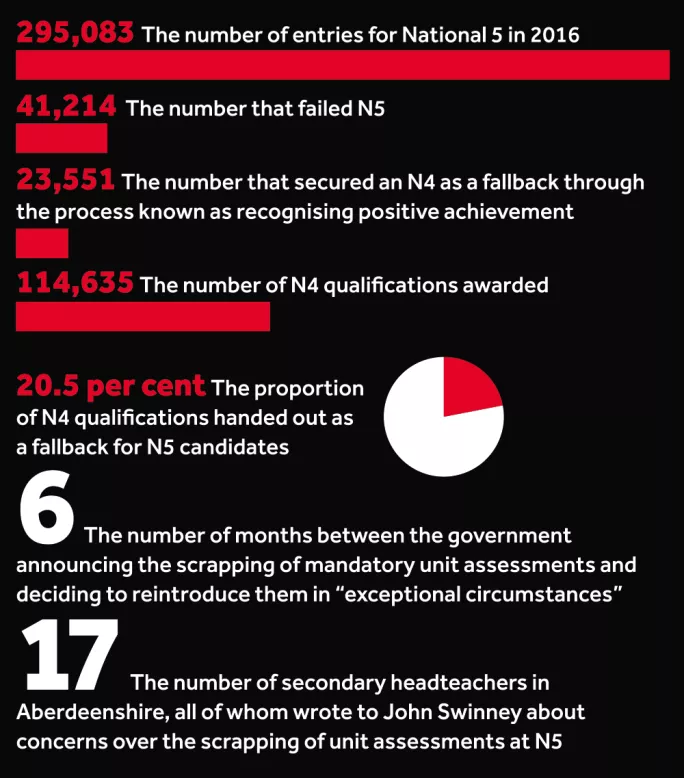Swinney ‘knew pupils would be left without a safety net’

The Scottish government has known since it decided to scrap mandatory unit assessments last year that the move would leave pupils who failed the National 5 exam without a safety net, Tes Scotland can reveal.
At the end of last month, education secretary John Swinney announced emergency measures to prevent pupils from leaving S4 with no qualifications.
The move to reintroduce unit assessments in “exceptional circumstances” followed Mr Swinney’s decision to scrap the assessments last year at the behest of the teaching unions, owing to workload concerns.
He also announced that the mark required to achieve a D grade at N5 would be lowered from 45 to 40 per cent, so that more pupils could secure a grade even if they did not pass.
However, the official report that led to unit assessments being scrapped last September - obtained by Tes Scotland through a freedom of information request - shows that the government knew from the outset that removing mandatory unit assessments at N5 would disadvantage pupils who failed the exam.
In the six months since the announcement that the assessments would be scrapped, Scottish schools have faced a period of uncertainty amid concerns that some pupils would leave school without any qualifications.
Previously, pupils who failed the N5 exam used the unit assessments to gain an N4 in a process known as “recognising positive achievement” (RPA). Last year, 14 per cent of entries at N5 resulted in a fail but more than half of these - over 23,000 entries - gained an N4 through RPA.
Concern about the withdrawal of this “fallback facility” led Aberdeenshire’s 17 secondary heads to write a joint letter to Mr Swinney in February, expressing their fears.
The price of failure
However, the risks have been known to the government since September, it has emerged.
The government’s proposals to scrap mandatory unit assessments at N5 and Higher were submitted to the Assessment and National Qualifications working group (ANQ), chaired by Mr Swinney, on 12 September.
The report said that there was a need “to secure recognition for candidates who might not achieve A-D” at N5 and “for whom certificated units provide an opportunity to demonstrate attainment”.
The report recommended then that the grade range should be expanded for N5; it also envisaged the introduction of an E grade - but that proposal was rejected.
Stephen Miller, president of secondary headteachers’ organisation School Leaders Scotland (SLS), said that the “gulf” between N4 and N5 should have been addressed before unit assessments were scrapped.
That is now the “most pressing priority” facing the ANQ working group, said Mr Miller, who sits on the group and is head at Denny High in Falkirk. Although the government’s own report had highlighted the fact that some pupils could be disadvantaged by the reforms, “I don’t think the consequences were properly thought through, and to an extent the decisions since have been out of sync with each other,” added Mr Miller.
Despite Mr Swinney saying that unit assessments should only be reintroduced in “exceptional circumstances”, presenting pupils for the N5 units as well as the exam “will be more towards the norm than the exception” in some schools, according to Mr Miller.
But Dr Bill Maxwell, the head of school inspection body Education Scotland, told Tes Scotland that this could result in the schools concerned being investigated.
“Should Education Scotland identify any situation where presentation patterns do not appear to reflect the advice in the ANQ group communication, it will investigate further to ensure that decisions made locally have been in the best interests of learners,” he said.
Larry Flanagan, general secretary of the EIS teaching union, warned against more than “a handful” of N5 exam candidates being put through unit assessments.
Exam body the Scottish Qualifications Authority has ramped up coursework demands and extended exams in preparation for the unit assessments being removed, he said, meaning that the least-able pupils would now potentially be juggling unit assessments, more demanding coursework and a longer exam.
Mr Flanagan said: “If schools try to use this for whole groups, Education Scotland should be going in there and saying, ‘That’s unacceptable.’ This is for a handful of kids who are borderline.” He called for schools to introduce “two-year qualification pathways”, as well as a focus on exit qualifications, and to move away from the “two-term dash” towards exams.
The Scottish government said that the decision to keep in place the N4 fallback was taken “after a period of thorough consideration of feedback from key stakeholders”.
The spokesperson added: “School leaders will play an important role in ensuring this interim measure is deployed in exceptional circumstances, to support aspirational presentation for specific learners only.”

You need a Tes subscription to read this article
Subscribe now to read this article and get other subscriber-only content:
- Unlimited access to all Tes magazine content
- Exclusive subscriber-only stories
- Award-winning email newsletters
Already a subscriber? Log in
You need a subscription to read this article
Subscribe now to read this article and get other subscriber-only content, including:
- Unlimited access to all Tes magazine content
- Exclusive subscriber-only stories
- Award-winning email newsletters